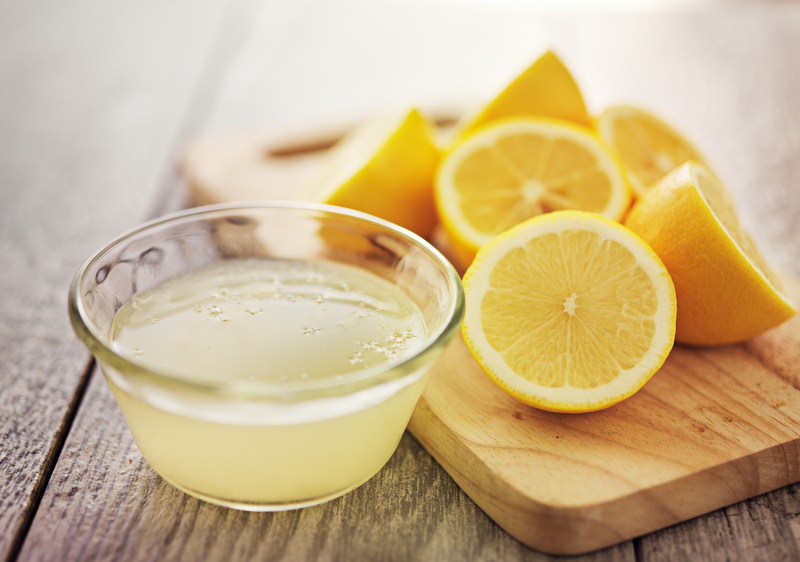Natural Limescale Solutions
Posted on 11/12/2024
Limescale is a chalky white substance that often builds up around faucets, showerheads, and inside appliances like kettles and washing machines. It primarily consists of calcium carbonate and forms when hard water evaporates, leaving behind these mineral deposits. Hard water is laden with high concentrations of calcium and magnesium ions, increasing the likelihood of limescale formation over time.
The Problems Caused by Limescale
Limescale is more than just an unsightly blemish; it can cause significant damage to your home and appliances. Unchecked limescale buildup can lead to:
- Reduced efficiency in heating elements.
- Clogged pipes and reduced water flow.
- Increased energy consumption.
- Shortened lifespan of appliances.
- Frequent maintenance requirements.

Why Choose Natural Limescale Solutions?
While commercial limescale removers are available, they often contain harsh chemicals that can be harmful to the environment and your health. Natural limescale solutions offer a safer, eco-friendly alternative to these chemical-based products. They can be just as effective but come without the risk of further eroding your fixtures and harming your family and pets.
Natural Limescale Removal Techniques
Vinegar and Baking Soda
One of the most effective natural limescale removers is a simple solution of vinegar and baking soda. Both of these substances have properties that help dissolve calcium carbonate.
How to Use:
1. Mix equal parts white vinegar and water.
2. Apply the mixture to the limescale-affected area.
3. Let it sit for about 30 minutes.
4. Scrub with a sponge or cloth.
5. Rinse thoroughly with water.
For tougher stains, a paste of baking soda and water can be applied to the affected area, followed by a vinegar spray.
Lemon Juice
Lemon juice is another effective natural limescale remover due to its acidic nature. It's particularly useful for brightening metal fixtures.
How to Use:
1. Cut a lemon in half and rub it directly onto the limescale.
2. Let the juice sit for about 30 minutes.
3. Scrub and rinse with water.
Essential Oils
Certain essential oils, such as tea tree oil or eucalyptus oil, have mild acidic properties that can break down limescale while leaving a refreshing scent.
How to Use:
1. Add a few drops of essential oil to water.
2. Apply the mixture to the limescale.
3. Allow it to sit for a few minutes before scrubbing and rinsing.
Tips for Preventing Limescale Buildup
Use Water Softeners
Installing a water softener can significantly reduce the calcium and magnesium content in your water, thereby preventing limescale buildup.
Regular Cleaning
Regularly cleaning your appliances and fixtures can prevent the accumulation of limescale. Aim to clean high-use areas like faucets and showerheads at least once a week using natural solutions.
Use a Filter
Install filters on your faucets and showerheads to capture minerals before they can form limescale.
Pros and Cons of Natural Limescale Solutions
Pros
- Eco-Friendly: Natural solutions are biodegradable and less harmful to the environment.
- Non-Toxic: These methods are safer for your health and household pets.
- Cost-Effective: Most natural limescale removers are everyday household items that are inexpensive.
- Multipurpose: These solutions can often be used for various types of cleaning around the home.
Cons
- Time-Consuming: Natural methods might require more time and effort compared to commercial products.
- Effectiveness: Tougher limescale deposits might need repeated application to remove completely.
- Limited Availability: You might not always have the necessary ingredients on hand.

Takeaways
Natural limescale solutions offer an effective, eco-friendly alternative to chemical cleaners. Vinegar, baking soda, lemon juice, and certain essential oils can all serve as potent removers. Preventing limescale buildup is equally important and can be achieved by using water softeners, regular cleaning, and installing filters.
Conclusion
Natural limescale solutions are a practical, cost-effective, and safer way to deal with hard water deposits. While they may require a bit more elbow grease, the benefits far outweigh the minor inconveniences. By incorporating these natural methods into your routine, you can keep your home and appliances free from limescale while protecting the environment.
Latest Posts
Uncovering the Benefits of Hot Water Extraction
Save Time on Bathroom Cleaning Chores
Quick House Clean in 30 Minutes








